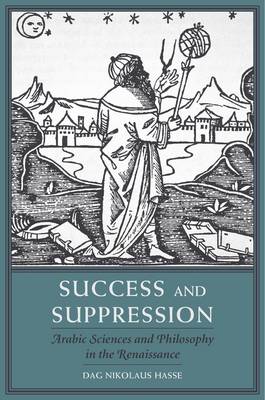

Stock image for illustration purposes only - book cover, edition or condition may vary.
Success and Suppression: Arabic Sciences and Philosophy in the Renaissance
Dag Nikolaus Hasse
€ 15.00
FREE Delivery in Ireland
Description for Success and Suppression: Arabic Sciences and Philosophy in the Renaissance
hardcover. Dag Nikolaus Hasse shows how ideological and scientific motives led to the decline of Arabic traditions in European culture. The Renaissance was a turning point: on the one hand, Arabic scientific traditions reached their peak of influence in Europe; on the other, during this period the West began to forget, or suppress, its debt to Arabic culture. Series: I Tatti Studies in Italian Renaissance History. Num Pages: 640 pages, 7 halftones. BIC Classification: HBLH; PDX. Category: (P) Professional & Vocational. Dimension: 169 x 289 x 53. Weight in Grams: 1090. Good clean copy with minor shelfwear. DJ has some minor nicks and tears, remains very good
The Renaissance marked a turning point in Europe's relationship to Arabic thought. On the one hand, Dag Nikolaus Hasse argues, it was the period in which important Arabic traditions reached the peak of their influence in Europe. On the other hand, it is the time when the West began to forget, and even actively suppress, its debt to Arabic culture. Success and Suppression traces the complex story of Arabic influence on Renaissance thought. It is often assumed that the Renaissance had little interest in Arabic sciences and philosophy, because humanist polemics from the period attacked Arabic learning and championed Greek civilization. Yet Hasse shows that Renaissance denials of Arabic influence emerged not because scholars of the time rejected that intellectual tradition altogether but because a small group of anti-Arab hard-liners strove to suppress its powerful and persuasive influence. The period witnessed a boom in new translations and multivolume editions of Arabic authors, and European philosophers and scientists incorporated--and often celebrated--Arabic thought in their work, especially in medicine, philosophy, and astrology. But the famous Arabic authorities were a prominent obstacle to the Renaissance project of renewing European academic culture through Greece and Rome, and radical reformers accused Arabic science of linguistic corruption, plagiarism, or irreligion. Hasse shows how a mixture of ideological and scientific motives led to the decline of some Arabic traditions in important areas of European culture, while others continued to flourish.
Product Details
Format
Hardback
Publication date
2016
Publisher
Harvard University Press
Condition
Used, Very Good
Series
I Tatti Studies in Italian Renaissance History
Number of Pages
640
Place of Publication
Cambridge, Mass, United States
ISBN
9780674971585
SKU
KTS0038188
Shipping Time
Usually ships in 2 to 4 working days
Ref
99-1
About Dag Nikolaus Hasse
Dag Nikolaus Hasse is Professor of the History of Philosophy at the University of Wurzburg.
Reviews for Success and Suppression: Arabic Sciences and Philosophy in the Renaissance
A must-read for people working on the histories of philosophy, medicine, or science in Renaissance Italy. In this important book, Hasse challenges a reigning paradigm in Renaissance studies, documenting the continuing centrality of the Arabic tradition in Italy and the complex interactions of humanism and Arabism in scientific and philosophical teaching and debates.
Katharine Park, Harvard University Success and Suppression is rich not only in its coverage of topics, but also in the variety of sources consulted and implications pursued. No matter which approach one takes or what background one brings to this book, the very exercise of reading it will bring unmitigated pleasure, if for no other reason than the vast tour d'horizon Hasse offers to the reader.
George Saliba, Columbia University
Katharine Park, Harvard University Success and Suppression is rich not only in its coverage of topics, but also in the variety of sources consulted and implications pursued. No matter which approach one takes or what background one brings to this book, the very exercise of reading it will bring unmitigated pleasure, if for no other reason than the vast tour d'horizon Hasse offers to the reader.
George Saliba, Columbia University
